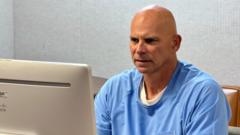Lyle Menendez has been denied parole one day after his brother Erik encountered the same fate, following over three decades behind bars. Convicted for the 1989 murders of their parents in Beverly Hills, the Menendez brothers faced separate lengthy hearings before the California parole board, culminating in disappointing news for both.
At 57, Lyle, portrayed historically as the more dominant sibling, can reapply for parole in three years. Their parents, Jose and Kitty Menendez, were murdered in an incident that captured national attention and prompted trials that have remained significant in criminal history. The brothers contended that their actions were in self-defense, citing years of emotional and sexual abuse from their father, but prosecutors depicted them as deceitful, entitled individuals who meticulously orchestrated the killings and subsequently squandered their inheritance.
During the hearing, which lasted over 10 hours, Lyle attended virtually from the San Diego prison, where he is currently housed. The panel evaluated whether Lyle would present a risk to society if released, examining both his past and conduct in prison. He reflected on his academic journey at Princeton University, his suspension due to plagiarism, and various past misdemeanors.
A key issue during hearings was Lyle's continuous use of illicit cell phones while incarcerated, bringing significant skepticism over his accountability. Panel members questioned whether they should weigh his positive achievements in prison against the rules he violated. Lyle admitted to recent violations related to cellphone use, acknowledging its prohibitive nature within correctional facilities.
Lyle characterized himself as a helpful inmate who works towards resolving conflicts among prisoners, showing compassion through various initiatives. Despite earning academic accolades and mentoring fellow inmates, a risk assessment highlighted concerns about his antisocial traits and inability to face repercussions.
Now, as both brothers face another wait of three years before potentially applying for parole again, their future rests partly on Governor Gavin Newsom, who is considering a clemency request that could alter their sentences. The brothers are also seeking a retrial based on emerging evidence of past abuse from their father, although this request encounters opposition from the district attorney's office.
With the complexities surrounding their case and looming uncertainties about possible clemency, the Menendez brothers continue to navigate a challenging path toward any hope of freedom.



















